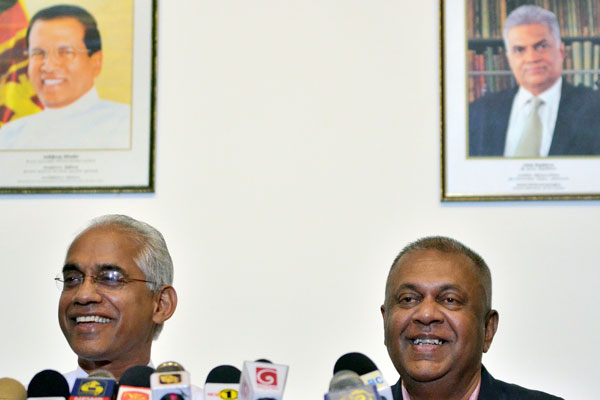Wednesday Feb 25, 2026
Wednesday Feb 25, 2026
Thursday, 9 November 2017 00:00 - - {{hitsCtrl.values.hits}}

Finance Minister Mangala Samaraweera and State Minister of Finance Eran Wickramaratne announced tax reductions on six essential items yesterday– Pic by Shehan Gunasekera
By Skandha Gunasekara
On the eve of Budget 2018, Finance Minister Mangala Samaraweera rolled out a pre-budget relief package that will cost the Government an estimated Rs. 1.5 billion each month to slash taxes on six essential goods.
Giving the strongest indication yet that the Government was preparing for local government polls in January, Samaraweera issued the Gazette notification, which will come into effect from midnight on Wednesday. Samaraweera, however, was quick to distance the relief package from upcoming elections, denying that it was intended to attract votes.
The Minister was also upbeat over today’s Budget, insisting it would “kick-start the economy” and help achieve the island’s economic and development goals.
“There is a Chinese saying that it is better to give a man a fishing pole and teach him to fish than to give him a slice of fish. We follow the same policy and hope to encourage the youth in this country to stand on their feet. But there are times when help is needed immediately and we believe, given the natural disasters the country has faced, this is one of those times.”
He also told reporters that the potential reduction in prices would be a relief measure targeting thousands of farmers who were severely affected by what the United Nations has described as the worst drought in 40 years.
Despite the return of rains, some parts of the country are still affected by drought with the Government forced to increase imports of essential items such as rice and coconuts to reduce the growing cost of living. Inflation spiked to 7.8% in October, the highest point in eight months, and was higher than what was predicted by the Central Bank. Inflation is expected to remain challenging in the short term as the festive months lead up to elections early next year.
The Government has decided to roll out relief measures ahead of the Budget, to be presented today, to ensure that the focus will remain on the Government’s much-awaited reform agenda, Cabinet spokesman Dr. Rajitha Senaratne told reporters at the weekly Cabinet briefing.
“The Government feels that its efforts to improve the economy should be focused on by the public and any relief measures would distract from this central goal. Therefore a decision was made to release details about the tax reductions on food a day ahead,” he said.
Cabinet also approved a report titled ‘Recent Economic Trends: Special Incidents in 2017 and Expectations in 2018’ of the Central Bank of Sri Lanka, which is to be presented in Parliament. The Cabinet paper was presented by Prime Minister Ranil Wickremesinghe in his capacity as the Minister of National Policies and Economic Affairs. The report includes matters about progress in the foreign, public finance and finance sectors.
Finance Minister Samaraweera was also optimistic that prices of coconuts would also be reduced later this month after imports hit the market. Nonetheless, he conceded that the Government would review the price of essential goods in several months.
“It is my opinion that the price of goods will not remain stable in an open economy but fluctuate from time to time. We will review the prices of essential goods in about three months time and decide if changes need to be made,” he said.
Joining his colleague, State Minister of Finance Eran Wickramaratne noted that Minister Samaraweera had taken an unprecedented decision with this relief package.
“Normally if a Finance Minister makes an announcement about essential goods before the Budget it is to increase the prices. However, this time around, the Minister has taken the initiative to lessen the burden on the people even before the Budget.”
Accordingly, the tax levied on a kilogram of sprats has been reduced by Rs. 10, potatoes by Rs. 39, big onions by Rs. 39, dhal by Rs. 9, split dhal by Rs. 12 and dried fish by Rs. 50.
Additionally, the taxes on unrefined palm oil, vegetable oil and palm stearin have been reduced by Rs. 15, while refined palm oil, refined vegetable oil, unrefined palm kernel oil and coconut oil have been reduced by Rs. 25. Taxes on refined palm kernel oil have been reduced by Rs. 35.